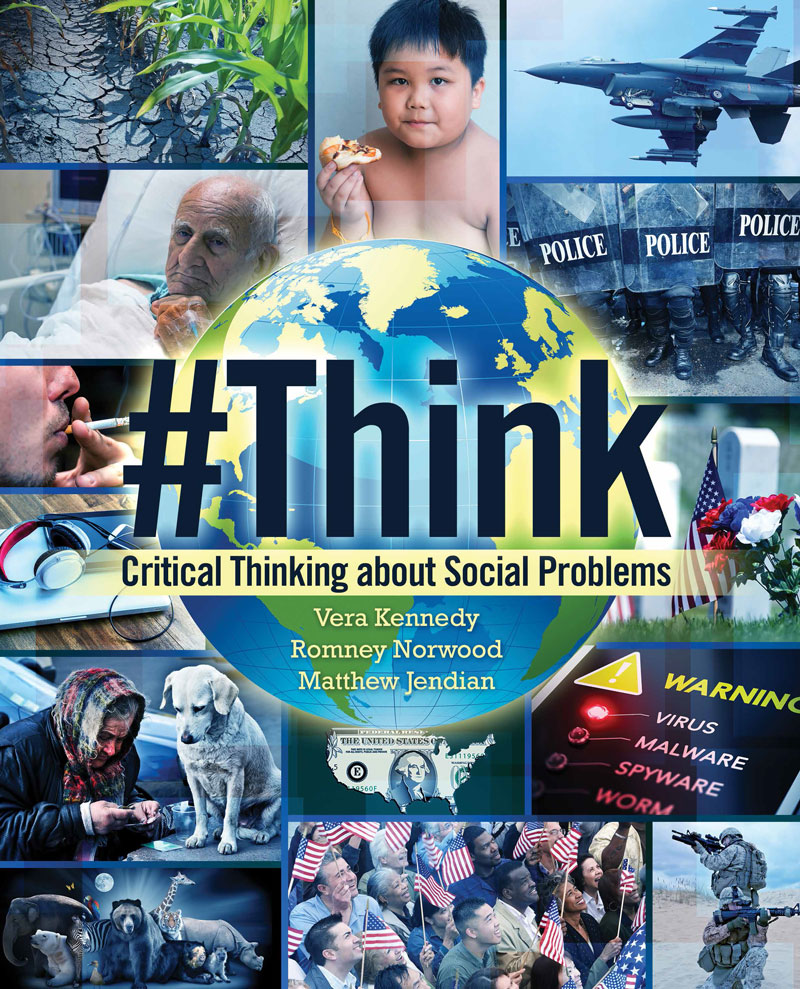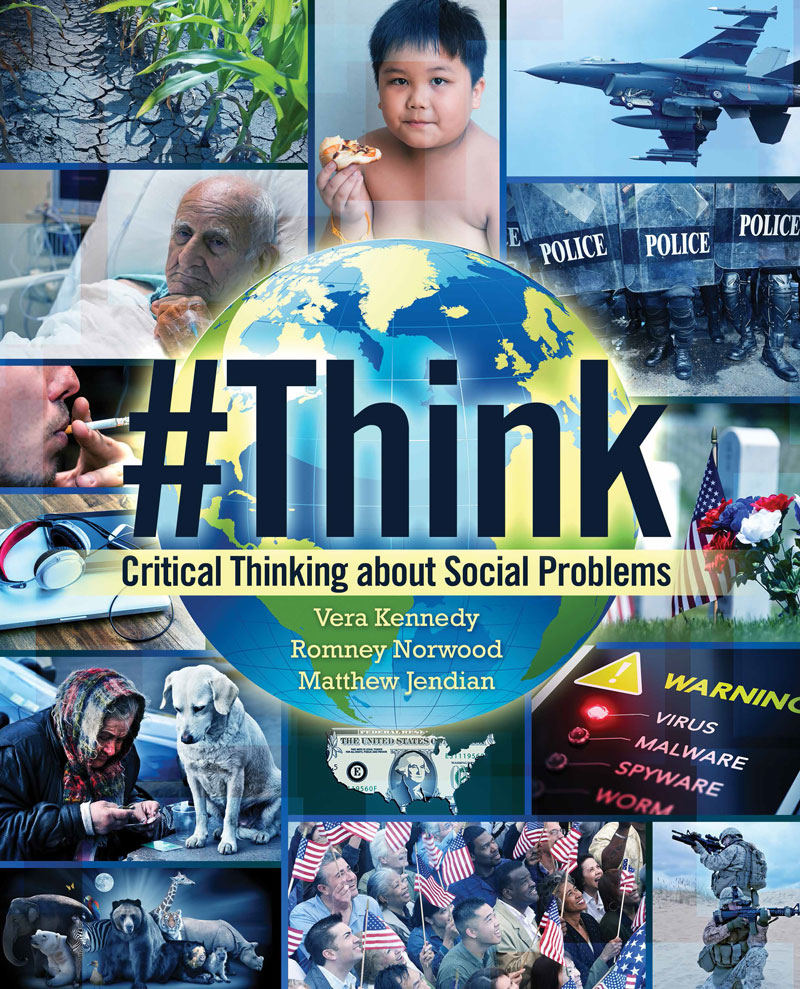#Think: Critical Thinking about Social Problems
Author(s): Vera Kennedy , Romney Norwood , Matthew Ari Jendian
Edition: 1
Copyright: 2017
Pages: 148
Edition: 1
Copyright: 2017
Pages: 148
Strengthen your students’ social awareness and increase civic involvement…
#Think: Critical Thinking about Social Problems is a groundbreaking social problems publication that features an unprecedented fusion of integrated lectures and sociological applications that emphasize critical thinking principles, critical service learning pedagogy, and public sociology.
#Think Critical Thinking about Social Problems encourages readers to apply critical thinking skills to examine causes and solutions to social problems.
#Think: Critical Thinking about Social Problems
- Promotes Active Learning! Embedded exercises (i.e., sociological applications) encourage reflective thinking, social literacy and responsibility, and civic involvement.
- Is Relevant! Each of the six modules contain several current and emerging social issues to employ critical thinking.
- Is Flexible! Modules can be incorporated as needed or desired to customize the learning experience.
- Is Comprehensive! Critical thinking and sociological fundamentals are included in modules 1 and 2 to build competencies.
Module 1 What Is Critical Thinking?
Key Terms
Characteristics of Critical Thinking
How Critical Thinking Works
Sociological Application 1.1
Sociological Application 1.2
Sociological Application 1.3
The Strength of Critical Thinking
Sociological Application 1.4
Sociological Application 1.5
Core Critical Thinking Skills
Ethical Reasoning
Sociological Application 1.6
Critical Service Learning Pedagogy
Sociological Application 1.7
References
Module 2 Public Sociology
Sociological Analysis
Sociological Imagination
Sociological Application 2.1
Theoretical Paradigms
Major Theoretical Paradigms
Emerging Theoretical Paradigms
Demography
Sociological Application 2.2
Social Research
Objective vs. Subjective Analysis
Scientific Method: A Five-step Research Process
Research Design: Quantitative and Qualitative
Sociological Application 2.3
References
Module 3 The Power of Culture
Culture and Identity
Social Issues
Race Relations
Racial Profiling
Color-Blind Racism
Sociological Application 3.1
Minority Success and Cultural Capital
Immigration
Gender and Sexuality
Beyond the Gender Binary
Rape in the Military
Pornography
Income Gap
Social Class
Sociological Application 3.2
Economic Inequality
Poverty
Food Insecurity
Sociological Application 3.3
Evaluating Critical Thinking and Credibility
Theoretical Analysis
Social Policy
Social Movements and Reform
References
Module 4 Political Economy
Political Ideology and Economic Theory
Social Issues
Domination and Hegemony
Campaign Finance
Corporate Welfare
War Profiteers
Media Control
Place and Space
Climate Change
Biodiversity
Sociological Application 4.1
Sociological Application 4.2
Technology Gap
Evaluating Critical Thinking and Credibility
Theoretical Analysis
Social Policy
Social Movements and Reform
References
Module 5 Crime and Violence
Deviance and Social Control
Social Issues
State Violence
Declaration of War and Authorized Use of Military Force
Sociological Application 5.1
Terrorism
Sociological Application 5.2
Genocide
Predatory Violence
Mass Shootings
Infanticide
Executions
Sociological Application 5.3
Modern Slavery
Forced Labor
Sex Trafficking
Sociological Application 5.4
Organizational Deviance
Elite Deviance
Prison Industrial Complex
Combat Drones
Cybercrime
Privacy
Identity Theft and Fraud
Cyberbullying
Sociological Application 5.5
Evaluating Critical Thinking and Credibility
Theoretical Analysis
Social Policy
Social Movements and Reform
References
Module 6 Physical, Mental, and Social Wellness
Defining Health Disparities and Inequalities
Social Issues
Obesity
Tobacco
Big Pharma
Sociological Application 6.1
Mental Illness
End-of-Life Issues
Sociological Application 6.2
Evaluating Critical and Thinking Credibility
Theoretical Analysis
Social Policy
Social Movements and Reform
References
Index
Vera Guerrero Kennedy was born and raised in San Joaquin Valley, California. She received a B.A. in sociology (1995) and M.P.A. in political science with an emphasis in public administration (1999) from Fresno State and a doctorate in education (Ed.D.) with an emphasis in curriculum and instruction from Argosy University (2012). She is certified by the National Grant Writers Association as a Senior Certified Grants Specialist and Certified Grants Reviewer.
Dr. Kennedy is a tenured faculty at West Hills College Lemoore and Lecturer at Fresno State. Her research publications include The Influence of Cultural Capital on Hispanic Student College Graduation Rates and Improving Undergraduate Student Understanding of Social Research through Service Learning. She serves on the Merlot Sociology Editorial Board and was an e-textbook reviewer in 2015 for the California OER Council (Cool4Ed). She was awarded West Hills Community College District Innovation Awards in 2015 and 2016 for her application of information, imagination, and initiative in transforming curriculum and instruction by integrating open education resources and e-devices.
Dr. Kennedy was invited to participate in the eScholars program at Fresno State (2012) to prepare and move beyond basic online course work by developing creative and engaging learning experiences for students. In 2010 she received the National Institute for Staff and Organizational Development (NISOD) Excellence Award and was recognized by the West Hills College Lemoore Team TEACH program as an All-star in Teaching. She received a Certificate of Recognition for the 7th Annual Outstanding Leadership Awards in Honor of Hispanic Heritage Month from the California State Assembly (2005) for work in applied social research, organizational development, and capacity building in partnership with public and non-profit agencies.
Before teaching full-time, Dr. Kennedy worked as the Juvenile Justice Services Coordinator for the Fresno Superior Court and assisted in the establishment and facilitation of the Juvenile Mental Health Court for Fresno County. She owned and operated a private consulting firm for six years. From 1999– 2002, she served as the Associate Director for the Central California Center for Health and Human Services at Fresno State. Dr. Kennedy served on the Board of Directors for Comprehensive Youth Services, a child abuse prevention agency for eight years, and was appointed by the Fresno County Board of Supervisors to serve on the Fresno County Foster Care Oversight Committee for six years. She also served as a member of the Fresno County Human Resources Advisory Board responsible for reviewing and recommending local grant funding administered by the County of Fresno.
She and her husband, Greg, reside in Fresno, California with their “fur” kids, Woofers and Osa.
Romney Simone Norwood was born and raised in Shreveport, Louisiana. She received a B.S. in broadcast journalism (1995) from Boston University, an M.A. in sociology (1996) from Arizona State University and a dual title Ph.D. in sociology and demography (2001) from The Pennsylvania State University. Dr. Norwood is a tenured faculty member at Perimeter College at Georgia State University. Her research publications include Marital Strain and Depressive Symptoms among African Americans (with Keith) and Ethnic Differences in Public Participation: The Role of Conflict Communication Styles and Sense of Community (with Bernstein) which received the Top Paper Award at the 2007 annual International Public Relations Research Conference.
Dr. Norwood has also used her research skills in applied settings such as the Centers for Disease Control and Prevention (CDC,) where her training as a behavioral scientist was utilized to help implement a new schedule for administering the polio vaccine to children in the United States. For her work with the National Immunization Program (NIP) at the CDC, Dr. Norwood received a certificate of commendation for the development of the scientific and programmatic basis for the introduction of a sequential schedule for the prevention of vaccine-associated poliomyelitis in the United States and was recognized for Outstanding Achievement in Public Health by the U.S. Department of Health and Human Services.
Dr. Norwood is committed to offering her students opportunities to engage with their local communities and in 2012 she received the Faculty Fellow Award at Perimeter College which provides resources to support and encourage the development of service learning opportunities for students. Dr. Norwood has a long record of engaging in community service. She volunteers regularly with numerous organizations in the Atlanta metropolitan area and for 12 years she has volunteered monthly with Ten Thousand Villages, a fair trade organization with the goal of ensuring that artisans from developing countries are paid fairly for the handcrafted items that they produce and sell to sustain their families. Dr. Norwood served as board member for Ten Thousand Villages —Atlanta from 2007–2012.
She and her husband Louis reside in Atlanta, Georgia with their son Asher “the Dasher.”
Matthew Ari Jendian was born and raised in Fresno and received his B.A. in sociology and minor degrees in psychology and Armenian Studies from Fresno State (1991) and his M.A. (1995) and Ph.D. (2001) in Sociology from University of Southern California (USC).
Dr. Jendian is founding director of the Humanics Program at Fresno State and serves as a tenured Full Professor and Chair of sociology. He is the author of several peer-reviewed journal articles as well as Becoming American, Remaining Ethnic (LFB Scholarly Publishing, 2008), and he was honored in Menk, an encyclopedia of biographies of prominent Armenian scholars.
Dr. Jendian is the recipient of several honors, including the 2012 President’s Award of Excellence presented by the University Advisory Board at Fresno State in recognition of his integrity, leadership and commitment to the university and community, the 2008 “Provost’s Award for Faculty Service,” the 2016 “Together We Win Award” in recognition of his role in civic engagement, the 2014 “Trailblazer for Prosperity” Award from Southeast Fresno Community & Economic Development Association, the 2007 Social Action Award from Temple Beth Israel, and the 2007 “Amigo Award” presented by Vida en El Valle to “a non-Latino individual or organization that has worked tirelessly on behalf of the Latino community.” He was nominated for the 2009 California Campus Compact Cone Award for Excellence & Leadership in Cultivating Community Partnerships, was selected as part of the first cohort of the Irvine Foundation’s New Leadership Network, and has written and received national and federal grants to develop curricula that engage university students in capacity-building work with Community Benefit Organizations (CBOs) in Central California.
Dr. Jendian has served as a board member for several CBOs, including Nonprofit Leadership Alliance (formerly American Humanics, Inc.), Buchanan Babe Ruth Baseball Association, Inc., Fresno Nonprofit Advancement Council, Fresno Housing Alliance, Regenerate California Innovation (formerly Relational Culture Institute), and Fresno Metro Ministry and as an external evaluator with local and multinational CBOs, including Porterville College and Armenian General Benevolent Union.
He and his wife, Pam, reside in Clovis, California with their two sons, Joshua and Nicholas.
Strengthen your students’ social awareness and increase civic involvement…
#Think: Critical Thinking about Social Problems is a groundbreaking social problems publication that features an unprecedented fusion of integrated lectures and sociological applications that emphasize critical thinking principles, critical service learning pedagogy, and public sociology.
#Think Critical Thinking about Social Problems encourages readers to apply critical thinking skills to examine causes and solutions to social problems.
#Think: Critical Thinking about Social Problems
- Promotes Active Learning! Embedded exercises (i.e., sociological applications) encourage reflective thinking, social literacy and responsibility, and civic involvement.
- Is Relevant! Each of the six modules contain several current and emerging social issues to employ critical thinking.
- Is Flexible! Modules can be incorporated as needed or desired to customize the learning experience.
- Is Comprehensive! Critical thinking and sociological fundamentals are included in modules 1 and 2 to build competencies.
Module 1 What Is Critical Thinking?
Key Terms
Characteristics of Critical Thinking
How Critical Thinking Works
Sociological Application 1.1
Sociological Application 1.2
Sociological Application 1.3
The Strength of Critical Thinking
Sociological Application 1.4
Sociological Application 1.5
Core Critical Thinking Skills
Ethical Reasoning
Sociological Application 1.6
Critical Service Learning Pedagogy
Sociological Application 1.7
References
Module 2 Public Sociology
Sociological Analysis
Sociological Imagination
Sociological Application 2.1
Theoretical Paradigms
Major Theoretical Paradigms
Emerging Theoretical Paradigms
Demography
Sociological Application 2.2
Social Research
Objective vs. Subjective Analysis
Scientific Method: A Five-step Research Process
Research Design: Quantitative and Qualitative
Sociological Application 2.3
References
Module 3 The Power of Culture
Culture and Identity
Social Issues
Race Relations
Racial Profiling
Color-Blind Racism
Sociological Application 3.1
Minority Success and Cultural Capital
Immigration
Gender and Sexuality
Beyond the Gender Binary
Rape in the Military
Pornography
Income Gap
Social Class
Sociological Application 3.2
Economic Inequality
Poverty
Food Insecurity
Sociological Application 3.3
Evaluating Critical Thinking and Credibility
Theoretical Analysis
Social Policy
Social Movements and Reform
References
Module 4 Political Economy
Political Ideology and Economic Theory
Social Issues
Domination and Hegemony
Campaign Finance
Corporate Welfare
War Profiteers
Media Control
Place and Space
Climate Change
Biodiversity
Sociological Application 4.1
Sociological Application 4.2
Technology Gap
Evaluating Critical Thinking and Credibility
Theoretical Analysis
Social Policy
Social Movements and Reform
References
Module 5 Crime and Violence
Deviance and Social Control
Social Issues
State Violence
Declaration of War and Authorized Use of Military Force
Sociological Application 5.1
Terrorism
Sociological Application 5.2
Genocide
Predatory Violence
Mass Shootings
Infanticide
Executions
Sociological Application 5.3
Modern Slavery
Forced Labor
Sex Trafficking
Sociological Application 5.4
Organizational Deviance
Elite Deviance
Prison Industrial Complex
Combat Drones
Cybercrime
Privacy
Identity Theft and Fraud
Cyberbullying
Sociological Application 5.5
Evaluating Critical Thinking and Credibility
Theoretical Analysis
Social Policy
Social Movements and Reform
References
Module 6 Physical, Mental, and Social Wellness
Defining Health Disparities and Inequalities
Social Issues
Obesity
Tobacco
Big Pharma
Sociological Application 6.1
Mental Illness
End-of-Life Issues
Sociological Application 6.2
Evaluating Critical and Thinking Credibility
Theoretical Analysis
Social Policy
Social Movements and Reform
References
Index
Vera Guerrero Kennedy was born and raised in San Joaquin Valley, California. She received a B.A. in sociology (1995) and M.P.A. in political science with an emphasis in public administration (1999) from Fresno State and a doctorate in education (Ed.D.) with an emphasis in curriculum and instruction from Argosy University (2012). She is certified by the National Grant Writers Association as a Senior Certified Grants Specialist and Certified Grants Reviewer.
Dr. Kennedy is a tenured faculty at West Hills College Lemoore and Lecturer at Fresno State. Her research publications include The Influence of Cultural Capital on Hispanic Student College Graduation Rates and Improving Undergraduate Student Understanding of Social Research through Service Learning. She serves on the Merlot Sociology Editorial Board and was an e-textbook reviewer in 2015 for the California OER Council (Cool4Ed). She was awarded West Hills Community College District Innovation Awards in 2015 and 2016 for her application of information, imagination, and initiative in transforming curriculum and instruction by integrating open education resources and e-devices.
Dr. Kennedy was invited to participate in the eScholars program at Fresno State (2012) to prepare and move beyond basic online course work by developing creative and engaging learning experiences for students. In 2010 she received the National Institute for Staff and Organizational Development (NISOD) Excellence Award and was recognized by the West Hills College Lemoore Team TEACH program as an All-star in Teaching. She received a Certificate of Recognition for the 7th Annual Outstanding Leadership Awards in Honor of Hispanic Heritage Month from the California State Assembly (2005) for work in applied social research, organizational development, and capacity building in partnership with public and non-profit agencies.
Before teaching full-time, Dr. Kennedy worked as the Juvenile Justice Services Coordinator for the Fresno Superior Court and assisted in the establishment and facilitation of the Juvenile Mental Health Court for Fresno County. She owned and operated a private consulting firm for six years. From 1999– 2002, she served as the Associate Director for the Central California Center for Health and Human Services at Fresno State. Dr. Kennedy served on the Board of Directors for Comprehensive Youth Services, a child abuse prevention agency for eight years, and was appointed by the Fresno County Board of Supervisors to serve on the Fresno County Foster Care Oversight Committee for six years. She also served as a member of the Fresno County Human Resources Advisory Board responsible for reviewing and recommending local grant funding administered by the County of Fresno.
She and her husband, Greg, reside in Fresno, California with their “fur” kids, Woofers and Osa.
Romney Simone Norwood was born and raised in Shreveport, Louisiana. She received a B.S. in broadcast journalism (1995) from Boston University, an M.A. in sociology (1996) from Arizona State University and a dual title Ph.D. in sociology and demography (2001) from The Pennsylvania State University. Dr. Norwood is a tenured faculty member at Perimeter College at Georgia State University. Her research publications include Marital Strain and Depressive Symptoms among African Americans (with Keith) and Ethnic Differences in Public Participation: The Role of Conflict Communication Styles and Sense of Community (with Bernstein) which received the Top Paper Award at the 2007 annual International Public Relations Research Conference.
Dr. Norwood has also used her research skills in applied settings such as the Centers for Disease Control and Prevention (CDC,) where her training as a behavioral scientist was utilized to help implement a new schedule for administering the polio vaccine to children in the United States. For her work with the National Immunization Program (NIP) at the CDC, Dr. Norwood received a certificate of commendation for the development of the scientific and programmatic basis for the introduction of a sequential schedule for the prevention of vaccine-associated poliomyelitis in the United States and was recognized for Outstanding Achievement in Public Health by the U.S. Department of Health and Human Services.
Dr. Norwood is committed to offering her students opportunities to engage with their local communities and in 2012 she received the Faculty Fellow Award at Perimeter College which provides resources to support and encourage the development of service learning opportunities for students. Dr. Norwood has a long record of engaging in community service. She volunteers regularly with numerous organizations in the Atlanta metropolitan area and for 12 years she has volunteered monthly with Ten Thousand Villages, a fair trade organization with the goal of ensuring that artisans from developing countries are paid fairly for the handcrafted items that they produce and sell to sustain their families. Dr. Norwood served as board member for Ten Thousand Villages —Atlanta from 2007–2012.
She and her husband Louis reside in Atlanta, Georgia with their son Asher “the Dasher.”
Matthew Ari Jendian was born and raised in Fresno and received his B.A. in sociology and minor degrees in psychology and Armenian Studies from Fresno State (1991) and his M.A. (1995) and Ph.D. (2001) in Sociology from University of Southern California (USC).
Dr. Jendian is founding director of the Humanics Program at Fresno State and serves as a tenured Full Professor and Chair of sociology. He is the author of several peer-reviewed journal articles as well as Becoming American, Remaining Ethnic (LFB Scholarly Publishing, 2008), and he was honored in Menk, an encyclopedia of biographies of prominent Armenian scholars.
Dr. Jendian is the recipient of several honors, including the 2012 President’s Award of Excellence presented by the University Advisory Board at Fresno State in recognition of his integrity, leadership and commitment to the university and community, the 2008 “Provost’s Award for Faculty Service,” the 2016 “Together We Win Award” in recognition of his role in civic engagement, the 2014 “Trailblazer for Prosperity” Award from Southeast Fresno Community & Economic Development Association, the 2007 Social Action Award from Temple Beth Israel, and the 2007 “Amigo Award” presented by Vida en El Valle to “a non-Latino individual or organization that has worked tirelessly on behalf of the Latino community.” He was nominated for the 2009 California Campus Compact Cone Award for Excellence & Leadership in Cultivating Community Partnerships, was selected as part of the first cohort of the Irvine Foundation’s New Leadership Network, and has written and received national and federal grants to develop curricula that engage university students in capacity-building work with Community Benefit Organizations (CBOs) in Central California.
Dr. Jendian has served as a board member for several CBOs, including Nonprofit Leadership Alliance (formerly American Humanics, Inc.), Buchanan Babe Ruth Baseball Association, Inc., Fresno Nonprofit Advancement Council, Fresno Housing Alliance, Regenerate California Innovation (formerly Relational Culture Institute), and Fresno Metro Ministry and as an external evaluator with local and multinational CBOs, including Porterville College and Armenian General Benevolent Union.
He and his wife, Pam, reside in Clovis, California with their two sons, Joshua and Nicholas.




